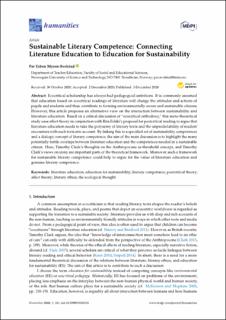Sustainable Literary Competence: Connecting Literature Education to Education for Sustainability
Peer reviewed, Journal article
Published version
Permanent lenke
https://hdl.handle.net/11250/2993988Utgivelsesdato
2020Metadata
Vis full innførselSamlinger
- Institutt for lærerutdanning [3692]
- Publikasjoner fra CRIStin - NTNU [38127]
Originalversjon
10.3390/h9040141Sammendrag
Ecocritical scholarship has always had pedagogical ambitions. It is commonly assumed that education based on ecocritical readings of literature will change the attitudes and actions of pupils and students and thus contribute to forming environmentally aware and sustainable citizens. However, this article proposes an alternative view on the interaction between sustainability and literature education. Based on a critical discussion of “ecocritical orthodoxy,” this meta-theoretical study uses affect theory in conjunction with Rita Felski’s proposal for postcritical reading to argue that literature education needs to take the polysemy of literary texts and the unpredictability of readers’ encounters with such texts into account. By linking this to a specified set of sustainability competences and a dialogic concept of literary competence, the aim of the main discussion is to highlight the many potentially fertile overlaps between literature education and the competences needed in a sustainable citizen. Here, Timothy Clark’s thoughts on the Anthropocene as threshold concept, and Timothy Clark’s views on irony are important parts of the theoretical framework. Moreover, such a framework for sustainable literary competence could help to argue for the value of literature education and genuine literary competence.

